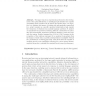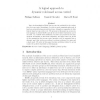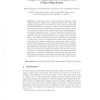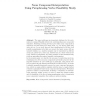AIMSA
2008
Springer
14 years 6 months ago
2008
Springer
Abstract. State of the art formalisms for distributed ontology integration provide ways to express semantic relations between concepts belonging to different ontologies. However, t...
AIMSA
2008
Springer
14 years 6 months ago
2008
Springer
Abstract. This paper reports on experiments performed in the development of the QALL-ME system, a multilingual QA infrastructure capable of handling input requests both in written ...
AIMSA
2008
Springer
14 years 6 months ago
2008
Springer
In order to build an intelligent system that allows human beings to cooperate with a computing machine to perform a given task it is important to account for the individual charact...
AIMSA
2008
Springer
14 years 6 months ago
2008
Springer
Relational instance-based learning (RIBL) algorithms offer high prediction capabilities. However, they do not scale up well, specially in domains where there is a time bound for c...
AIMSA
2008
Springer
14 years 6 months ago
2008
Springer
Since its formalization RBAC has become the yardstick for the evaluation of access control formalisms. In order to meet organizational needs, it has been extended along several di...
AIMSA
2008
Springer
14 years 6 months ago
2008
Springer
An alternative way to tackle Information Retrieval, called Passage Retrieval, considers text fragments independently rather than assessing global relevance of documents. In such a ...
AIMSA
2008
Springer
14 years 6 months ago
2008
Springer
This paper presents the Agent MOdeling LAnguage (AMOLA). This language provides the syntax and semantics for creating models of multi-agent systems covering the analysis and design...
AIMSA
2008
Springer
14 years 6 months ago
2008
Springer
Abstract. The paper addresses an important challenge for the automatic processing of English written text: understanding noun compounds’ semantics. Following Downing (1977) [1], ...
AIMSA
2008
Springer
14 years 6 months ago
2008
Springer
Integrated modeling of temporal and logical constraints is important for solving real-life planning and scheduling problems. Logical constrains extend the temporal formalism by rea...
AIMSA
2008
Springer
14 years 6 months ago
2008
Springer
Abstract. The problem of curriculum-based course timetabling is studied in this work. In addition to formally defining the problem, we present a hybrid solution algorithm (Adaptiv...




